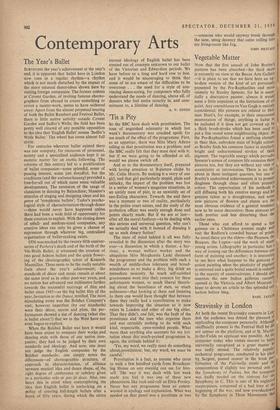'Tis a Pity
So the BBC have dealt with prostitution. The tone of anguished solemnity in which last week's documentary was couched spoilt for me much of the effect of the programme. First, as an appetiser, there was Miss Mary Adams telling us that prostitution was a problem; and the BBC really felt that they must deal with it; but if we were going to be offended at all, would we please switch off.
And so to the documentary itself, prepared with loving attention to B-picture cliché by Mr. Colin Morris. By making it a story of one girl, and that girl particularly stupid, plain and unlucky, the impact of the problem was lost in a welter of woman's magazine situations, in an untidy mess of plot, in an unwieldy set of neo-Ealing characters. Towards the end there was a moment or two of reality, particularly in the police court scenes, and the study of the probation officer was neatly enough done and points clearly made. But if we are at last— after all the moral fanfares—to be dealing with this serious and universal question, why can't we actually deal with it instead of dressing it up as such dreary fiction?
The state of mind behind it all was fully revealed in the discussion after the story was over—a discussion in which a doctor, a bar- rister, a woman welfare worker and the ubiquitous Miss Marghanita Laski discussed the programme and the problem with such a wealth of middle-class tolerance and broad- mindedness as to make a dirty, big drink' an immediate necessity. So much self-satisfied graciousness went into their concern for these unfortunate women, so much liberal theoris- ing about the beastliness of men, so much politeness—that looking at them and listening to them one would have thought that between them they really had a contribution to make towards improving the situation as it now exists in London and other of our big cities. That they didn't, one felt, was the fault of the prostitutes and the men who organise them and was certainly nothing to do with such kind, respectable, open-minded people. What more than anything else accounts for my irri- tation about this much-praised programme is, again, the attitude behind it : 'Yes, my word, we really must do something about prostitution; but, my word, we must be careful.'
Prostitution is a fact, as anyone who cares to walk a few hundred yards from Broadcast- ing House on any evening can see for him- self. The way it was dealt with last week made you feel it was one of these new phenomena like rock-and-roll or Elvis Presley. Never has any programme been so cotton- wooled in apology and explanation. What was needed on that panel was a prostitute or two —someone who would anyway break through , the sane, smug decency that came rolling into ; my living-room like fog.
JOHN METCALF'


































 Previous page
Previous page